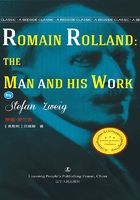
第7章 THE CONSECRATION
THE two years in Italy, a time of free receptivity and creative enjoyment, were over. A summons now came from Paris; the Normal School, which Rolland had left as pupil, required his services as teacher. The parting was a wrench, and Malwida von Meysenbug's farewell was designed to convey a symbolical meaning. She invited her young friend to accompany her to Bayreuth, the chief sphere of the activities of the man who, with Tolstoi, had been the leading inspiration of Rolland during early youth, the man whose image had been endowed with more vigorous life by Malwida's memories of his personality. Rolland wandered on foot across Umbria,to meet his friend in Venice. Together they visited the palace in which Wagner had died, and thence journeyed northward to the scene of his life's work."My aim," writes Malwida in her characteristic style,which seldom attains strong emotional force, but is none the less moving, "was that Romain should have these sublime impressions to close his years in Italy and the fecund epoch of youth. I likewise wished the experience to be a consecration upon the threshold of manhood, with its prospective labors and its inevitable struggles and disillusionments."
Olivier had entered the country of Jean Christophe!On the first morning of their arrival, before introducing her friend at Wahnfried, Malwida took him into the garden to see the master's grave. Rolland uncovered as if in church, and the two stood for a while in silence meditating on the hero, to one of them a friend, to the other a leader. In the evening they went to hear Wagner's posthumous work Parsifal.This composition, which, like the visit to Bayreuth,is strangely interconnected with the genesis of JeanChristophe, is as it were a consecrational prelude to Rolland's future. For life was now to call him from these great dreams. Malwida gives a moving description of their good-by. "My friends had kindly placed their box at my disposal. Once more I went to hear Parsifal with Rolland, who was about to return to France in order to play an active part in the work of life. It was a matter of deep regret to me that this gifted friend was not free to lift himself to'higher spheres,' that he could not ripen from youth to manhood while wholly devoted to the unfolding of his artistic impulses. But I knew that none the less he would work at the roaring loom of time, weaving the living garment of divinity. The tears with which his eyes were filled at the close of the opera made me feel once more that my faith in him would be justified.Thus I bade him farewell with heartfelt thanks for the time filled with poesy which his talents had bestowed on me. I dismissed him with the blessing that age gives to youth entering upon life."
Although an epoch that had been rich for both was now closed, their friendship was by no means over. For years to come, down to the end of her life,Rolland wrote to Malwida once a week. These letters,which were returned to him after her death, contain a biography of his early manhood perhaps fuller than that which is available in the case of any other notable personality. Inestimable was the value of what he had learned from this encounter. He had now acquired an extensive knowledge of reality and an unlimited sense of human continuity. Whereas he had gone to Rome to study the art of the dead past, he had found the living Germany, and could enjoy the companionship of her undying heroes. The triad of poesy, music, and science, harmonizes unconsciously with that other triad, France, Germany, and Italy. Once and for all,Rolland had acquired the European spirit. Before he had written a line of Jean Christophe, that great epic was already living in his blood.